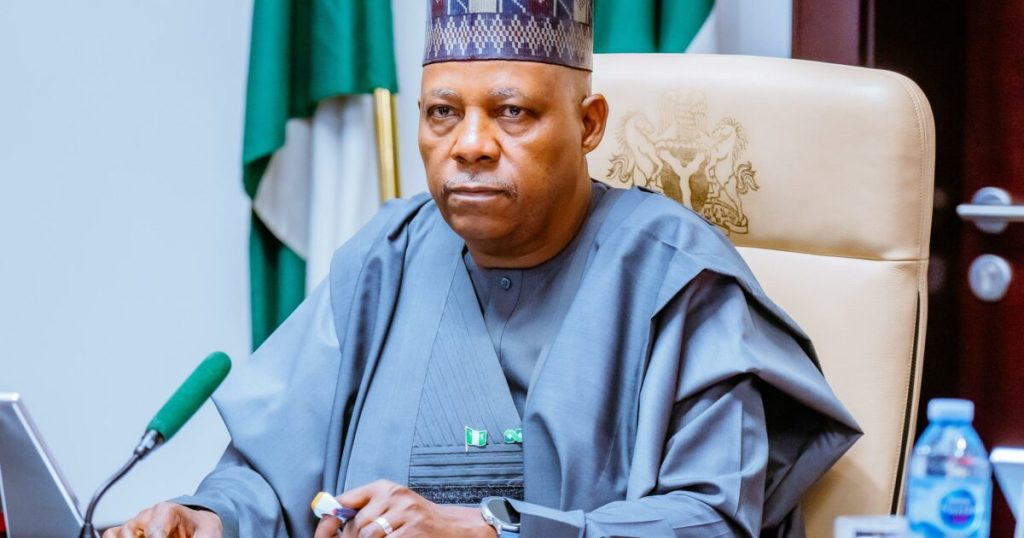Paragraph 1: The Call for Collaborative Action and Global Best Practices
Vice President Kashim Shettima has issued a fervent call to action, urging stakeholders in Nigeria’s road safety sector to join forces and implement robust measures to significantly reduce road crash fatalities and injuries by 50% by the year 2030. This urgent appeal underscores the gravity of the road safety crisis in Nigeria and emphasizes the critical need for a collaborative approach involving government officials, transport experts, and road safety advocates. The Vice President stressed the importance of embracing global best practices and implementing realistic strategies to enhance safety on Nigerian highways, setting a clear target for the nation to achieve within the next seven years. This call to action was made during the 8th Annual Lecture Series of the Federal Road Safety Corps (FRSC), a pivotal event that brought together key players in the road safety landscape to discuss the pressing issue of road safety management in the face of emerging transportation trends.
Paragraph 2: The Grim Statistics and the Relevance of the FRSC Lecture Series
The alarming statistics presented by the FRSC paint a stark picture of the road safety challenges facing Nigeria. In just the first six months of 2025, over 5,281 crashes were recorded, involving nearly 40,000 individuals. Tragically, these crashes resulted in the loss of 2,838 lives and left 17,818 people injured. These sobering figures highlight the urgent need for effective interventions and underscore the relevance of the FRSC’s Annual Lecture Series. The theme of the 8th edition, “Road Safety Management and Emerging Transportation Trends: Global Partnership and Optimal Performance,” directly addresses the growing complexity of road safety issues in a rapidly evolving transportation sector. The Vice President praised the timeliness and relevance of the theme, emphasizing its focus on leveraging global partnerships to adopt international best practices in road safety management.
Paragraph 3: The Role of the FRSC and Government Support
The FRSC Annual Lecture Series serves as a vital platform for evaluating performance, identifying areas requiring improvement, and raising awareness about road safety issues across the nation. Vice President Shettima acknowledged the positive impact of previous lecture series, noting their contribution to improved driving habits and enhanced emergency response mechanisms. He also commended the FRSC for its growing regional influence, recognizing Nigeria’s leadership role in road safety management within West Africa and the broader African continent. The Federal Government reaffirmed its commitment to supporting the FRSC’s efforts through legislative backing, specifically referencing the FRSC Amendment Bill which has progressed through the House of Representatives and awaits Senate concurrence. This commitment extends to promoting compliance with global best practices and supporting innovations that strengthen the FRSC’s capacity to enforce road safety regulations.
Paragraph 4: A Call for Zero Deaths and Alignment with the Renewed Hope Agenda
Secretary to the Government of the Federation, Senator George Akume, echoed the Vice President’s call for intensified efforts in road safety management, setting an ambitious goal of “zero deaths” during the upcoming festive season. He emphasized the importance of implementing practical measures to achieve this target and commended the FRSC’s ongoing efforts in promoting road safety awareness, vehicle maintenance, and establishing standards for fleet operators. Akume highlighted the opportunity presented by the FRSC lecture series for Nigeria to learn from the stringent measures adopted by developed nations and enhance its road safety performance in line with global best practices. He linked the FRSC’s work to President Bola Tinubu’s Renewed Hope Agenda, emphasizing its contribution to promoting sustainable and safe mobility for all Nigerians.
Paragraph 5: Renewed Partnerships and Addressing Persistent Challenges
FRSC Corps Marshal, Shehu Mohammed, emphasized the need for renewed national and global partnerships to effectively address Nigeria’s persistent road safety challenges. The revival of the FRSC Lecture Series after a hiatus since 2017 signals a renewed commitment to tackling these challenges. He highlighted the alignment of the lecture series’ theme with the United Nations Assembly’s resolutions for Africa to significantly reduce road crash fatalities and injuries by 2030. Despite the FRSC’s significant efforts in enforcement, public enlightenment, and advocacy, Mohammed acknowledged the ongoing challenges reflected in the country’s road crash data, which indicates an average of 5,000 fatalities and over 31,000 injuries annually. This underscores the urgent need for greater resource allocation and effective implementation of the National Road Safety Strategy.
Paragraph 6: Looking Ahead with Optimism
The FRSC’s 8th Annual Lecture Series concluded with a sense of optimism and a shared commitment to translating discussions into concrete action. The hope is that the resolutions and recommendations arising from the event will lead to effective policy changes and positively influence road user behavior across Nigeria. The emphasis on collaboration, the adoption of global best practices, and the alignment with national development goals underscore the seriousness with which the issue of road safety is being addressed. The ultimate goal is to create safer roads for all Nigerians and significantly reduce the tragic toll of road crashes on lives and livelihoods.














